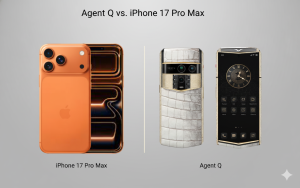Image source: Pexels
In the ever-evolving landscape of wearable technology, choosing the right device can feel like navigating a digital maze. As you gear up for your fitness endeavors in 2025, the question arises: does your wristwear truly empower your progress? This guide is designed to demystify the choice between a versatile Fitbit smartwatch, celebrated for its comprehensive health insights, and the precision-driven capabilities of top-tier GPS running watches. We'll delve into whether a Fitbit smartwatch delivers the granular health metrics you need for optimized workouts, or if a dedicated running watch offers the advanced data crucial for peak performance. Prepare to understand the core strengths of each, empowering you to select the perfect companion for your unique fitness journey and lifestyle in the US market.
Fitbit Smartwatch: Your All-Around Health and Fitness Companion in 2025
In 2025, the Fitbit smartwatch continues to solidify its position as a premier health and fitness companion, offering a blend of comprehensive tracking and user-friendly design. For individuals prioritizing a holistic approach to wellness, the Fitbit smartwatch provides an accessible gateway to understanding and improving their daily habits. Its integrated ecosystem, centered around the intuitive Fitbit app, empowers users with actionable insights derived from their personal data.
Understanding Fitbit's Core Health Metrics
At its heart, a Fitbit smartwatch excels in comprehensive tracking of daily activity. This includes fundamental metrics like steps taken, distance covered, calories burned, and active minutes. Beyond these foundational elements, advanced health monitoring is a cornerstone. Users benefit from continuous heart rate tracking, offering real-time insights into cardiovascular health during workouts and rest. Furthermore, sleep stages (light, deep, REM) are meticulously analyzed, providing a detailed picture of sleep quality. Many models also incorporate SpO2 (blood oxygen) monitoring, a valuable indicator of overall respiratory health and potential sleep disturbances.
| Metric | Fitbit Smartwatch (General) |
|---|---|
| Steps | ✓ |
| Distance | ✓ |
| Calories Burned | ✓ |
| Active Minutes | ✓ |
| Heart Rate (Cont.) | ✓ |
| Sleep Stages | ✓ |
| SpO2 Monitoring | ✓ (on select models) |
Beyond Steps: Key Features of Fitbit Smartwatches
The appeal of a Fitbit smartwatch extends far beyond basic activity logging. It integrates essential smart features such as notifications for calls, texts, and app alerts, keeping users connected without constant phone interaction. Basic app integration allows for seamless data syncing and access to a wealth of health and fitness programs. A significant advantage often cited is the longer battery life compared to some smartwatches, reducing the frequency of charging and ensuring continuous monitoring. This combination of robust health tracking and convenient smart functionalities makes the Fitbit smartwatch a compelling choice.
Who is a Fitbit Smartwatch Best For?
The user-friendly interface and app ecosystem make a Fitbit smartwatch
ideal for general wellness and fitness enthusiasts. Individuals looking for a straightforward yet powerful tool to monitor their daily activity, sleep patterns, and key health indicators will find significant value. It's particularly well-suited for those new to wearable technology or those who prefer a dedicated health focus over extensive app ecosystems found on other smartwatches. Whether you aim to increase your daily step count, improve sleep quality, or simply gain a better understanding of your body, a Fitbit smartwatch provides the necessary tools and motivation.
Top GPS Running Watches in 2025: Precision for Serious Athletes
In 2025, the landscape of GPS running watches is defined by an unwavering pursuit of precision and advanced data analytics, catering to athletes who demand the utmost from their training tools. While a Fitbit smartwatch offers a comprehensive suite of health tracking features, dedicated GPS running watches elevate performance monitoring to a professional level. These devices are engineered for runners, cyclists, and triathletes, providing the granular data necessary to optimize every stride and push personal boundaries.
The Edge of GPS Running Watches: Accuracy and Advanced Data
The cornerstone of any serious running watch is its GPS accuracy. For dedicated athletes, precise tracking of routes, distance, and pace is not just a convenience but a critical component of effective training. Inaccurate GPS can lead to miscalculated training zones, flawed performance analysis, and ultimately, hinder progress. Top-tier models in 2025 boast multi-band GPS and enhanced satellite reception, ensuring reliable data even in challenging environments like dense urban areas or thick forests. Beyond basic tracking, these watches offer sophisticated metrics that delve deep into a runner's physiology and biomechanics.
Key Metrics for Runners: Pace, Distance, and Training Load
Essential for any runner, pace and distance are the foundational metrics. However, advanced GPS running watches go far beyond these basics. They provide estimates of VO2 max, a key indicator of aerobic fitness, and offer insights into training status, helping athletes understand if they are undertraining, peaking, or overreaching. The recovery time advisor is another invaluable feature, suggesting optimal rest periods between intense workouts to prevent overtraining and injury. Furthermore, running dynamics such as cadence (steps per minute) and stride length offer crucial biomechanical feedback, enabling runners to refine their form and efficiency. While a Fitbit smartwatch can track steps and general activity, these specialized watches provide the depth required for performance-driven training.
Leading Running Watch Brands and Their Strengths (Garmin, Coros)
When it comes to GPS running watches, Garmin and Coros consistently stand out for their robust feature sets and athlete-centric designs.
| Feature/Item | Garmin (e.g., Forerunner Series) | Coros (e.g., Pace/Apex Series) |
|---|---|---|
| GPS Accuracy | Superior, multi-band support | Excellent, reliable tracking |
| Training Metrics | Comprehensive (VO2 max, Training Status, Recovery) | Advanced, focus on endurance |
| Durability | Rugged designs, often premium materials | Lightweight yet durable |
| Battery Life | Exceptional, ideal for ultra-endurance | Industry-leading, often weeks |
| Target Audience | Serious runners, cyclists, triathletes | Endurance athletes, trail runners |
Garmin watches are renowned for their extensive ecosystems, offering deep integration with their training platforms and a vast array of customizable data fields. Coros, on the other hand, has carved a niche with its exceptional battery life and a streamlined approach that prioritizes core performance metrics, making them a favorite among ultra-marathoners and endurance athletes. Unlike a general-purpose Fitbit smartwatch, these brands are laser-focused on athletic performance, offering durable designs built to withstand rigorous activity and extended use for long endurance events.
Fitbit vs. Top Running Watches: Decoding the Differences in 2025
As the wearable technology landscape continues to evolve, distinguishing between a general health tracker and a dedicated performance device becomes crucial. For 2025, the choice between a versatile Fitbit smartwatch and a specialized running watch hinges on your primary fitness goals. While both offer valuable insights, their core strengths and target audiences diverge significantly. Understanding these differences will help you invest wisely in a device that truly supports your active lifestyle.
Core Health Metrics: Fitbit's Strength vs. Running Watch Specialization
A Fitbit smartwatch truly excels in providing a holistic view of your daily health and activity. It's designed to encourage movement, track sleep patterns, monitor heart rate, and offer insights into stress levels, making it ideal for individuals focused on general wellness and building consistent healthy habits. Running watches, however, delve deeper into sport-specific performance. They typically offer advanced metrics like running dynamics (cadence, stride length), VO2 max estimates, training load, recovery time advisor, and detailed GPS mapping for precise route tracking and pace analysis.
| Feature/Metric | Fitbit Smartwatch (General Focus) | Top Running Watch (Performance Focus) |
|---|---|---|
| Heart Rate | Continuous, daily trends | Continuous, zone-based, recovery HR |
| Activity Tracking | Steps, calories, active minutes | Pace, distance, elevation, cadence |
| Sleep Tracking | Stages, duration, quality score | Sleep stages, readiness score |
| GPS | Often integrated, basic tracking | Advanced, multi-band, route import |
| Sport Modes | General fitness, diverse options | Highly specialized for running, cycling, etc. |
Battery Life Comparison: Everyday Use vs. Endurance Performance
Battery life is a critical differentiator. For everyday use, a Fitbit smartwatch often boasts superior longevity, easily lasting several days on a single charge, even with continuous heart rate monitoring and notifications. This makes them convenient for users who prioritize uninterrupted tracking without frequent charging. High-end running watches, particularly those with extensive GPS usage, tend to have shorter battery lives when actively tracking long runs or multi-day adventures. However, they are optimized for endurance performance, with some models offering extended GPS modes that can last for days, albeit with reduced functionality.
Smart Features and Ecosystem: Which Offers More Value?
When it comes to smart features and ecosystem integration, the landscape is varied. Brands like Apple Watch and Garmin, often considered top-tier running watches, offer robust smart features. This includes seamless integration with their respective smartphone ecosystems, extensive app stores, contactless payments, music storage, and advanced notification management. A Fitbit smartwatch also offers smart functionalities, but its ecosystem is more heavily oriented towards health and wellness applications, with a strong emphasis on its companion app for detailed data analysis and community features. The value here depends on whether you prioritize a broad smart assistant experience or a focused health and fitness platform.
Price Point Considerations: Budget-Friendly Options vs. Premium Investment
Both categories offer a range of price points. Budget-friendly Fitbits are readily available, making them an accessible entry point for general fitness tracking. Similarly, some running watches offer more affordable options that still provide core GPS and performance metrics. However, premium running watches, packed with advanced sensors and features, represent a significant investment. The decision often boils down to your primary use: if your focus is general fitness and daily activity, a Fitbit smartwatch might be the more practical and budget-friendly choice. For serious runners and triathletes who demand detailed performance data and long-duration GPS capabilities, investing in a specialized running watch is often warranted.
FAQ (Frequently Asked Questions)
Q1: Can a Fitbit smartwatch accurately track my runs for performance analysis?
A1: While a Fitbit smartwatch can track basic running metrics like distance, pace, and heart rate, it generally lacks the advanced GPS accuracy, specialized running dynamics, and detailed performance analytics (like VO2 max estimation or training load) found in dedicated GPS running watches. For serious performance analysis, a dedicated running watch is recommended.
Q2: Which type of watch has better battery life: a Fitbit smartwatch or a dedicated running watch?
A2: Generally, Fitbit smartwatches tend to offer longer battery life for everyday use, often lasting several days on a single charge. Dedicated running watches, especially when using GPS extensively for long periods, may have shorter battery lives, though many high-end models offer extended GPS modes for endurance events.
Q3: Is a Fitbit smartwatch sufficient for someone training for a marathon?
A3: For general training and monitoring daily activity and recovery, a Fitbit smartwatch can be beneficial. However, for precise pace tracking, detailed route mapping, advanced performance metrics, and race-day analysis crucial for marathon training, a dedicated GPS running watch would provide more accurate and comprehensive data.
Q4: What are the key differences in health metrics tracked by a Fitbit smartwatch versus a running watch?
A4: Fitbit smartwatches excel in broad health tracking, including steps, calories, sleep stages, SpO2, and continuous heart rate for overall wellness. Running watches focus on performance-specific metrics like VO2 max, training status, recovery time, running dynamics (cadence, stride length), and highly accurate GPS data for optimized athletic performance.
Conclusion
In the evolving landscape of wearable technology, the 2025 decision between a Fitbit smartwatch and a dedicated GPS running watch boils down to your unique fitness journey. As we've explored, Fitbits excel in providing a holistic view of your well-being, meticulously tracking everyday activity, sleep quality, and offering invaluable insights for general health enthusiasts. They are your allies in building sustainable habits and understanding your body's daily rhythms, making them an excellent choice for those prioritizing overall wellness. However, for the dedicated runner striving for PBs or the multi-sport athlete pushing performance boundaries, the specialized precision of a top-tier GPS running watch is indispensable. These devices offer the granular data – from advanced pace and distance metrics to recovery insights – that serious training demands. Therefore, your path forward is clear: If your focus is on comprehensive health monitoring, sleep optimization, and cultivating a more active lifestyle, a Fitbit smartwatch is your ideal companion. Embrace its user-friendly interface and all-encompassing health data to guide your daily choices. Conversely, if your sights are set on competitive goals and data-driven performance improvements in running or triathlons, a dedicated GPS running watch will be the more potent tool. Consider your budget and desired smart features as valuable secondary considerations, but let your primary fitness aspirations be the guiding star. Ready to make the smart choice for your fitness in 2025? If you're prioritizing overall health and daily activity tracking, explore the latest Fitbit smartwatch models today to find the perfect fit for your lifestyle. If peak performance is your goal, research top GPS running watches from brands like Garmin and Coros to unlock your athletic potential. Visit your preferred electronics retailer or online store now to find the device that will truly elevate your fitness journey!









